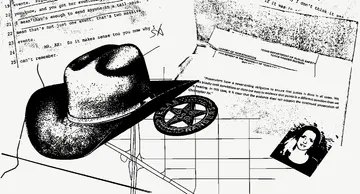This is The Marshall Project - Cleveland’s newsletter, a twice monthly digest of criminal justice news from around Ohio gathered by our staff of local journalists. Want this delivered to your inbox? Subscribe to future newsletters.
Proposals would ‘modernize’ Ohio’s HIV laws
Two bills introduced in April would largely repeal Ohio’s existing laws that criminalize people living with HIV, including making it a crime to donate blood and have sex without disclosing an HIV status — regardless of the risk of transmitting the virus.
The Marshall Project - Cleveland and The Buckeye Flame reported on the impact of existing laws in March, telling the story of Caymir Weaver, who was sentenced to a year in prison after prosecutors said he didn’t disclose to a partner that he had HIV. Weaver has since been released to a Cleveland-area halfway house.
Ohio laws are among the most punitive in the country, according to the Center for HIV Law and Policy. Equality Ohio and the Ohio Health Modernization Movement tallied at least 214 cases prosecuted statewide over a six-year period. Since then, a bipartisan coalition has stepped up efforts to replace Ohio’s current laws. The pending legislation was introduced by Rep. Sara Carruthers, a Republican from Hamilton in southwest Ohio.
The proposals have support from a broad coalition of advocates who say current laws are unjust and don’t reflect modern medical and scientific knowledge about HIV. Carruthers, who lost her bid for a fourth term in March, hasn’t returned calls from reporters seeking comment.
Cleveland’s Black Shield over the decades
Last month, we shared the story of the rise and fall of Vincent Montague, a former Cleveland police officer who also led the Black Shield, one of the oldest Black police associations in the country.
The history of the Black Shield, from its formation in the 1940s, to its civil rights lawsuits in the 1970s that pushed for fair hiring and promotion of Black and Hispanic officers, is woven into the makeup of policing in Cleveland to this day. For more insights, delve into some of that history in a timeline created by our colleague, Wilbert L. Cooper, who’s also working on a book, “The Black Shield.”
Spotlight: Juvenile justice and jail death reporting
“Delinquent: Our System, Our Kids,” a six-week series by Plain Dealer/Cleveland.com reporters Kaitlin Durbin and John H. Tucker, wrapped up last week. It explores Cuyahoga County’s juvenile justice system through the experiences of dozens of young people, along with their parents, crime victims, judges and others who work in the system.
The reporters built relationships with teens and young adults to examine the opportunities and flaws in a system that aims for rehabilitation but also sends the highest number of kids of any county in Ohio to adult prison through mandatory bindovers.
The stories provide insight into the lives of kids who end up in the system, including how trauma and gun violence play into the decisions they make.
A second series, “Dying Behind Bars,” is a yearlong investigation by The Cincinnati Enquirer, The Columbus Dispatch and USA Today Network, which detail nearly 220 deaths in Ohio jails over four years. Many overdosed on drugs, were assaulted, experienced medical issues or died by suicide. Local sheriffs investigated most of the deaths, raising questions about oversight. The majority of people in Ohio’s jails — 71% — haven’t been convicted of a crime.
In 2020, Ohio began requiring jails to report deaths, but not all were included in a state database, according to the news outlets’ investigation. There’s no penalty for failing to report a death. Reporters interviewed officials and family members of those who died, reviewed court documents and lawsuits and fought for internal investigations and video. The news organizations also created a way to search deaths by jail.
The Press Club of Cleveland honors reporting
A collaboration between Marshall Project - Cleveland staff writer Mark Puente and WEWS News 5 investigator Tara Morgan on debt-related driver’s license suspensions snagged multiple awards at the 2024 All Ohio Excellence in Journalism Awards last week. The series, which also got the attention of state lawmakers, won first place for data journalism, second place for in-depth reporting and third place for reporting on crime and justice.
Around the 216
- Cleveland police are increasingly relying on technology to prevent and solve crimes. But residents have questions about how cameras, license plate readers and gunshot detection are used in their neighborhoods. Signal Cleveland’s Stephanie Casanova explains what technology the department uses and how — and what oversight legal experts say is needed to protect the privacy and rights of residents.
- Cleveland City Council paused a plan to potentially send Cleveland police officers to Milwaukee and Chicago to support departments during the Republican and Democratic national conventions this summer, Signal Cleveland and Cleveland Documenters reported. Cleveland Interim Safety Director Wayne Drummond said the city’s costs would be reimbursed, but Safety Committee Chair Mike Polensek delayed taking action, complaining he wasn’t told of the legislation in advance. Council is on recess and doesn’t meet again until July.
- Canton city officials and community groups are in talks about creating a civilian oversight board, following a viral video that showed the use of a police dog during an arrest last month of a Black man who was face down with his hands behind his back, Ideastream Public Media reported. The incident comes amid three separate investigations in recent years of fatal police encounters involving Black men, most recently Frank Tyson, 53, who died in April after being left face down and handcuffed during his arrest.
